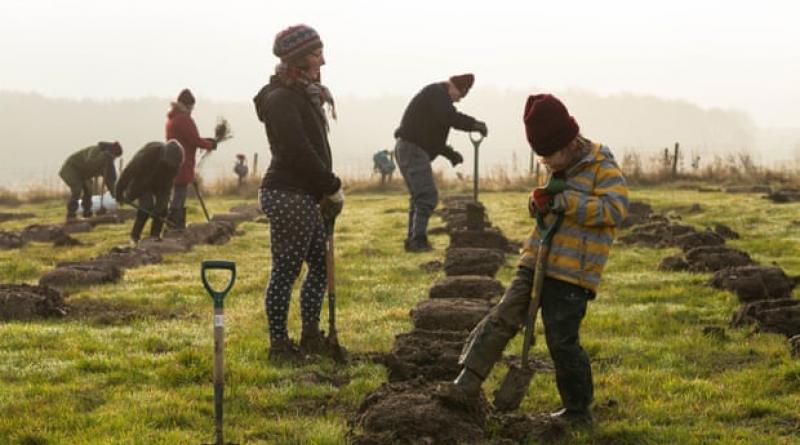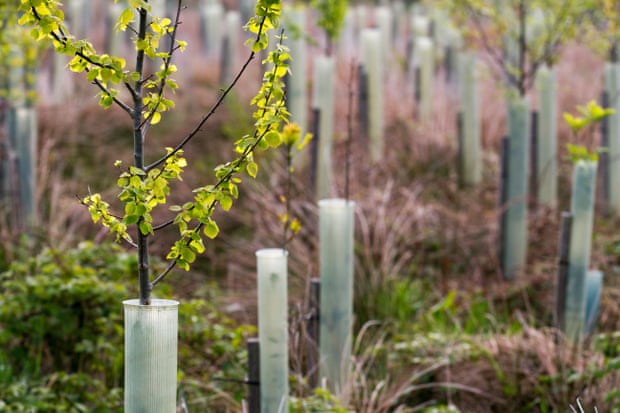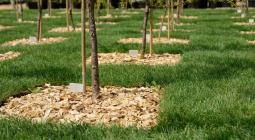Digging in: a million trees planted as villages and schools join climate battle.

Community forest projects have seen a surge in volunteers keen to reduce CO2 emissions by creating new woodlands.
The UK may be in the grip of a winter lockdown but in one village on the edge of the Yorkshire Dales the local climate-change group has been busy.
Plans are afoot to plant hundreds of trees on land surrounding Newton-le-Willows, in lower Wensleydale, in an effort to tackle the climate crisis. According to scientists, planting billions of trees across the world is one of the biggest and cheapest ways of taking CO2 out of the atmosphere.
Bob Sampson, a former land-use planning adviser for the Ministry of Agriculture and member of the village’s climate-change group, has written to local landowners asking permission to grow trees on their land. Seven have agreed so far, and he is now recruiting villagers to sponsor, and plant, trees.
The group is asking for £2 to cover the cost of a tree, a cane and a spiral to protect it from rabbits. They are yet to announce their plans in the village newsletter, but after a post on a WhatsApp group, which was started when the first lockdown was imposed in March last year, they’ve already had offers to sponsor more than 150 trees. “There’s been a positive response, much better than I was anticipating,” says Sampson.
“We’ll be planting trees including oak, sycamore, birch and rowan, which will be tailored to relevant sites and will benefit both the climate and the environment in terms of landscape and wildlife.”
This is not the only community gearing up to tackle the climate crisis during the pandemic. Since the first lockdown, there has been an increase in the number of people getting involved in projects aimed at improving local environments.
The Woodland Trust, which runs a free trees scheme for schools and community groups, has seen this firsthand. Last year it sent out a total of just over one million trees. Despite Covid, it had more applications for spring 2021 trees than for the previous year and it is due to send out close to half a million saplings. In December the trust was seeing between 5,000 and 10,000 trees being applied for daily; the average is 4,000 a day.

According to the Horticultural Trades Association, garden centre sales of hardy plants, shrubs and trees were up 50% from 13 May 2020 (when they reopened) to 31 January, compared with the same period the year before.
Kay Clark, community development manager at the Royal Horticultural Society, has also seen a surge in interest since the pandemic began. “We’ve found there is an uplift of new community groups, people coming to do things for the first time. It’s amazing,” she says. Calls to its inquiry service have increased and the majority are entry-level queries, she adds. “I don’t think we’ve ever known anything like it. It’s been crazy.”
The RHS is also inviting people to plant trees in memory of those who have lost their lives during the pandemic. Five hundred have been planted so far and the RHS has created a map online to keep track of where they are.
In Somerset, the Food Forest Project helped to facilitate the creation of a two-acre food forest just before Christmas. There’s another one planned for November this year near one of the most deprived areas in the county. Since the start of the pandemic, the organisation has planted close to 2,000 trees across five sites.
Tristan Faith, the founder, says: “Since March, there’s been a real shift towards self sufficiency and people thinking about what they can do. That has had a knock-on effect … and everyone wants to plant fruit trees.” He has also noticed an influx of people living in high-rise flats getting in touch about how they can get involved.
Hundreds of miles north in Dumfries and Galloway Margaret Pool, chair of the Langholm Initiative, has also seen more interest in environmental activities and more volunteers. “We’ve been inundated with interest since the pandemic began. Our membership stands at 740. Volunteers are welcome.” The charity is about to begin work on a new nature reserve, including 200 hectares of native woodland, on Langholm Moor – after raising £3.8m to purchase 5,000 acres of wildlife-rich and culturally important land from Buccleuch Estates.
Will this trend continue? Clark at the RHS believes so. “It’s like an awakening,” she says. “Once people start to become community-minded or start to grow things, that’s not something that leaves you. It becomes part of your life.”
The Guardian
13 February 2021





